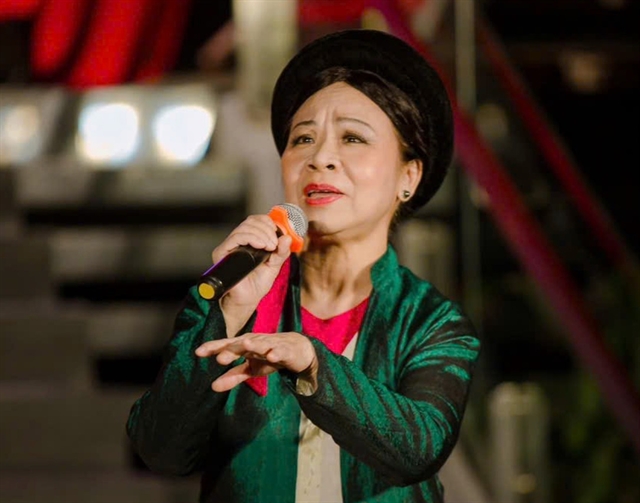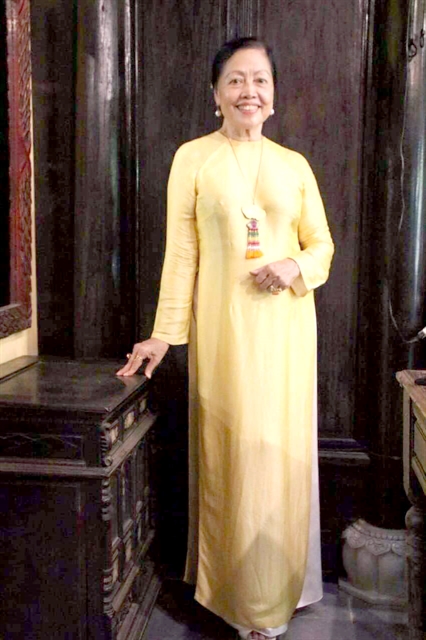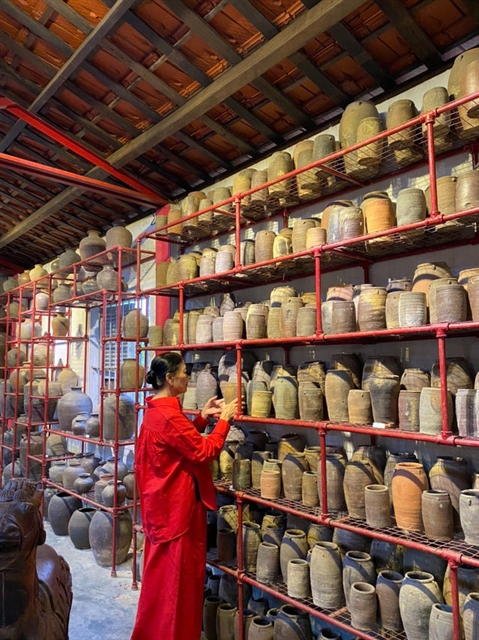 Inner Sanctum
Inner Sanctum

 |
| Thái Kim Lan in Vietnamese traditional áo dài costume– Photo courtesy of Thái Kim Lan |
Inner Sanctum: You have lived and worked in Germany for 50 years. Could you tell us about your educational journey and work experience there?
In 1965, I received a German Academic Exchange Service scholarship to study German linguistics in Munich, then West Germany. It was initially challenging due to my limited fluency, but we received invaluable support from German teachers at the Goethe Institutes across the country.
After two years, I graduated with a bachelor's degree and pursued philosophy at Ludwig Maximilian University. Fortunately, I received a university scholarship that funded my studies until I completed my doctoral thesis. Although the scholarship was modest, I still managed to support my family financially. However, studying at Munich University I also had some obstacles.
My previous BA in philosophy from Việt Nam was not fully recognised, so I had to start over. The language used in philosophical studies posed a significant challenge, demanding patience and perseverance.
I still remember the countless hours spent studying the works of Kant, Hegel, Heidegger, and the sweat poured from me, just like a farmer toiling in the fields.
Inner Sanctum: As a Vietnamese living in Germany for so many decades, what challenges have you encountered in preserving your Vietnamese cultural identity?
After more than five decades in Germany, I'm surprised I haven't fully assimilated like others. Despite integrating well, being abroad has made me aware of my unique identity. Strangers' gazes reflect my true self, revealing every aspect of my being.
The fusion of Vietnamese culture with other cultural influences has established a firm foundation for me to comprehend and embrace these "distinct" qualities for myself.
To sum it up, although I am often regarded as someone who upholds Vietnamese heritage, upon returning to Việt Nam, I perceive a remarkable difference within me, akin to possessing two contrasting faces.
Inner Sanctum: Would you mind telling us about the founding of the "Lan Viên Cố Tích", the Museum of Ancient Pottery?
The establishment of the Museum of Ancient Pottery on the Perfume River was completed through various fortuitous circumstances.
The collection of ancient pottery, initiated by my late brother, the renowned artist Thái Bá, and me, began in the 1980s. The unique beauty of the centuries-old buried pottery has captivated our interest ever since.
The second fortuitous event occurred in 2018 when I returned from Germany to celebrate Tết [Lunar New Year festival] in Huế. It was then that I realised the cultural connection between my family and my homeland, which I had overlooked during my half a lifetime away from home, immersing myself in learning across continents.
This realisation spurred me to establish a cultural venue to preserve our traditional heritage while modernising it.
Inner Sanctum: Your book 'Cõi Đi Về' (Homeward Bound) has just been released. Could you tell us more about the content?
The book is a collection of my writings from Tia Sáng (Light) magazine.
It is a blend of old wine in a new bottle, and I am delighted that artist Lê Thiết Cương has designed a beautifully refined cover that resonates with his "minimalist" interpretation of the book's content.
He aptly stated that Cõi Đi Về represents a return to cultural roots. Homesickness is not just longing for home, it is a yearning for the cradle of our cultural origin in the homeland.
It is true. The essence I want to convey is the cradle of culture in which each person is nurtured from birth and longs to return to, while also creating their own cradles during every journey.
The second aspect may be the attitude or circumstances of the writer. As an outsider without belonging to any group within the country, I maintain a natural sense of independence in my writing and I am not influenced by external pressures.
From my perspective, I aim to provide a different perspective and writing style, as a personal and free experiment.
 |
| Thái Kim Lan at Lan Viên Cố Tích (Ancient Pottery Museum) – Photos courtesy of Thái Kim Lan |
Inner Sanctum: Why do many people perceive philosophy as dry and inaccessible?
The field of philosophy has long been regarded as dry and difficult to approach. Even during my school years, this perspective was reinforced by the absence of philosophy as a general subject in high school or university curricula.
However, it is surprising that young people today are tending to show an interest in philosophy and exploring it to gain a profound understanding of the foundational structure of thought.
This understanding of the structure of human thought in today's society has become a necessity for an academic field with depth. I am more optimistic than pessimistic.
Human knowledge cannot be considered perfect without a philosophical understanding, which can be viewed as the foundation of culture. After all, isn't philosophy understood as the love of truth?
Inner Sanctum: Do you have any suggestions for increasing the popularity of philosophy and helping people gain a better understanding of its value?
For over 20 years, my proposal has been to introduce the teaching of philosophy in high schools and universities in Việt Nam with a more flexible and modern textbook approach.
Of course, basic subjects such as logic, metaphysics, epistemology, ethics, and psychology need to be practised. Bringing philosophy into the teaching curriculum is not something I can do as an outsider.
However, under certain conditions, I really hope that cultural centres like the Museum of Ancient Pottery will be a place for young generations to meet and engage in philosophical dialogue. That is my dream.
Inner Sanctum: What advice do you have for young people who aspire to become researchers in philosophy and culture?
Do it for the love of truth! It is the most thrilling love in a person's life.
Nearly 10 years ago, a group of young friends started a business in men's traditional áo dài [long dress] fashion from the Nguyễn era, but they faced criticism.
I advised them to stay strong because beauty is not only for women but also for men in terms of fashion. Beauty is like the manifestation of truth. Now, that young group has achieved remarkable success. The philosophers who are close to the truth will find true happiness. VNS




